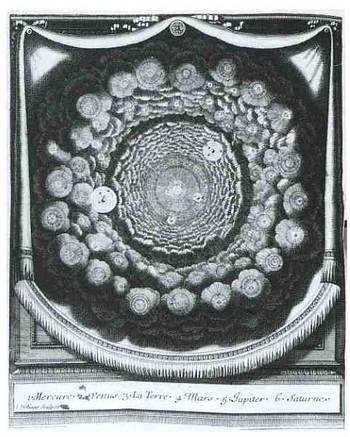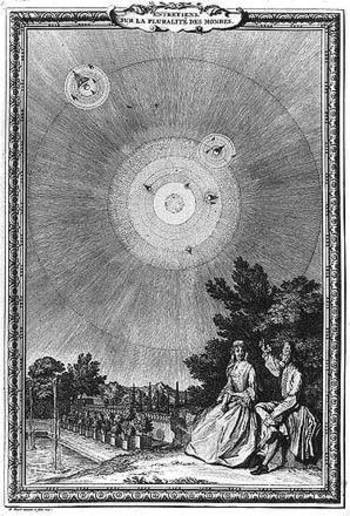 JF Ptak Science Books Post #69
JF Ptak Science Books Post #69
This first lovely image belongs to Entretiens sur la
Pluralitie de Mondes (Conversations on the Plurality of Worlds), written by the
great French philosophe Bernard le Bouvier de Fontenelle in 1686 (just a year
before publication of perhaps the greatest work in the history of science,
 What makes this engraving so particular and attractive to
me, and the reason why it is listed first in this series of scientific circles,
is because of its beauty and “deep depth”. The artist certainly related the compound nature and depth of the
universe, revealed to us from behind drawn curtains. Our solar system is featured prominently, with hosts of other solar systems borne on each puff of extragalactic clouds, reahcing, or descending, "all the way down Or up)". Fontenelle believed in the infinity of world
and the enormous-by-reason possibilities of the universe, as we see in this
extra from Plurality:
What makes this engraving so particular and attractive to
me, and the reason why it is listed first in this series of scientific circles,
is because of its beauty and “deep depth”. The artist certainly related the compound nature and depth of the
universe, revealed to us from behind drawn curtains. Our solar system is featured prominently, with hosts of other solar systems borne on each puff of extragalactic clouds, reahcing, or descending, "all the way down Or up)". Fontenelle believed in the infinity of world
and the enormous-by-reason possibilities of the universe, as we see in this
extra from Plurality:
,
lodg'd all over them in insensible varieties; and who are nourish'd upon the
Substance of these Stones which they eat. Consider the vast Numbers of these
little Animals, and how long a tract of Years they have liv'd upon a grain of
Sand. And by this Argument, tho my Moon were nothing but a confus'd heap of
Marble Rocks, I wou'd rather make it be devour'd and consum'd by its
Inhabitants, than to place none at all in it."
CONTINUE:
"To conclude, every thing lives, and every thing is animated; that is to say,
if you comprehend the Animals, that are generally known; the living Creatures
lately discover'd, and those that will be discover'd herafter, you will find
that the Earth is very well Peopl'd; and that Nature has been so liberal in
bestowing them, that she has not been at the pains to discover half of 'em.
After this, can you believe, that Nature, who has been fruitful to Excess as to
the Earth, is barren to all the rest of the Planets? My reason is convinc'd,
said the Marquiese, but my Fancy is confounded with the infinite Number
of living Creatures, that are in the Planets; and my thoughts are strangely
embarass'd with the variety that one must of Necessity imagine to be amongst
'em; because I know Nature does not love Repetitions; and therefore they must
all be different. But how is it possible for one to represent all these to our
Fancy? Our Imaginations can never comprehend this variety, said I, let us be
satisfied with our Eyes, or we may easily conceive by a universal view, Nature
has form'd variety in the several Worlds. All the Faces of Mankind are in
general near the same Form. Yet the two great Nations of our Globe, the Europeans
and Africans, seem to have been made after different Models. Nay, there
is a certain resemblance and Air of the Countenance peculiar to every Family or
Race of Men. Yet it is wonderful to observe how many Millions of Times, Nature
has varied so simple a thing as the Face of a
We, the Inhabitants of the Earth, are but one little Family of the Universe, we resemble one another. The Inhabitants of another Planet, are another Family, whose Faces have another Air peculiar to themselves; by all appearance, the difference increases with the distance, for cou'd one see an Inhabitant of the Earth, and one of the Moon together, he wou'd perceive less difference between them, than between an Inhabitant of the Earth, and an Inhabitant of Saturn. Here (for Example) we have the use of the Tongue and Voice, and in another Planet, it may be, they only speak by Signs. In another the Inhabitant speaks not at all. Here our Reason is form'd and made perfect by Experience. In another Place, Experience adds little or nothing to Reason. Further off, the old know no more than the young. Here we trouble our selves more to know what's to come, than to know what's past. In another Planet, they neither afflict themselves with the one nor the other; and 'tis likely they are not the less happy for that. Some say we want a sixth Sense by which we shou'd know a great many things we are now ignorant of. It may be the Inhabitants of some other Planet have this advantage; but want some of those other five we enjoy; it may be also that there are a great many more natural Senses in other Worlds; but we are satisfi'd with the five that are fal'n to our Share, because we know no better. Our Knowledge is bounded to certain limits, which the Wit of Man cou'd never yet exceed. There is a certain point where our Ingenuity is at a stand; that which is beyond it is for some other World, where it may be some things, that are familiar to us, are altogether unknown. Our Globe enjoys the Pleasure of Love; but is destroyed in several places by the fury of War. Another Planet enjoys constant Peace, without the delights of Love, which must render their Lives very irksom. In fine, Nature has done to the several Worlds in great, as she has done to us Mortals in little; by making some happy, others miserable. Yet she has never forgot her admirable Art in varying all things, tho she has made some equal in some respects, by compensating the want of any one thing, with another of equal value."
In 1699 Fontenelle wrote “Of the Usefulness of Mathematical Learning”, appearing in “A Translation of Part of Monsieur Fontenelle's Preface to the Memoirs of the Royal
Academy at Paris , in the Year 1699, treating of the Usefulness of Mathematical Learning", in Miscellanea Curiosa, second edition, London, 1708, vol. i.
“To what purpose should People
become fond of the Mathematicks and Natural Philosophy? ... People very readily
call Useless what they do not understand. It is a sort of Revenge ... .
“One would think at first that if
the Mathematicks were to be confin'd to what is useful in them, they ought only
to be improv'd in those things which have an immediate and sensible Affinity
with Arts, and the rest ought to be neglected as a Vain Theory. But this would
be a very wrong Notion. As for Instance, the Art of Navigation hath a necessary
Connection with Astronomy and Asronomy
can never be too much improv'd for the Benefit of Navigation. Astronomy cannot
be without Optics by reason of Perspective Glasses: and both, as all parts of
the Mathematicks are grounded upon Geometry “
He continues:
"But to what purpose should People become fond of the Mathematical and
Natural Philosophy? Of what use are the Transactions of the Academy? These are
common Questions, which most do not barely propose as Questions, and it will
not be improper to clear them. People very readily call useless, what they do
not understand. It is a sort of Revenge; and as the Mathematicks and Natural
Philosophy are known but by few, they are generally look'd upon as useless."
For Fontenelle’s impressive and concise obituary notice of



Comments